Steven Spielberg Gave Judd Hirsch A Blank Canvas To Create Uncle Boris In The Fabelmans
About a third of the way into Steven Spielberg's semi-autobiographical film "The Fabelmans," the titular family is visited by the wild and extroverted Uncle Boris, played by the legendary Judd Hirsch. Boris is the uncle of the family matriarch Mitzi (Michelle Williams), and the two seem to share a similar passion for the arts and for theatricality. There is some trepidation among the Fabelmans as to whether or not Boris should be allowed to interact with the teenage Sammy (Gabriel LaBelle), the Spielberg stand-in who has already become properly obsessed with filmmaking. Sammy's dad (Paul Dano) feels that exposure to a wild, artistic soul like Boris — once a professional lion tamer — will further push his son down the path of artistry, when a career in engineering would likely be easier and more lucrative.
That night, Boris shares a bedroom with Sammy, and he goes on a wild tear about how art and performance are something that live in the blood. Sammy, Boris says, will not be able to get rid of his artistic passions, declaring that he will indeed always put his artistic drives before his family. The rant is long and strange, and Hirsch seems to rotate through every possible emotional beat at a fevered intensity. It's a refreshingly odd scene in a movie that has been otherwise straightforward and sentimental up to that point.
In an interview with The Playlist, Hirsh, 87, noted that Spielberg let him play his scenes however he wanted. The director, it seems, had total faith in whatever Hirsch wanted to do. It appears that Hirsch wanted to swing for the walls, rave, and be intense and almost threatening, all while extolling the virtues of a life devoted to art.
The pressure was on
Of course, once he took on the role, a dark realization occurred to Judd Hirsch: there was a real person he would have to be emulating. Steven Spielberg, however, remained coy with his actor, letting him play the scene as his instincts dictated. The scene, Hirsch knew, was based on a very specific memory from the director's own teen years, leaving the actor wanting to ask questions, do research, and delve into the real-life version of "Uncle Boris." Nothing doing. Spielberg would not share. Hirsch explained:
"An actor has choices, and he hopes they're the best ones for the director [...] The other thought was, 'It's his story. My God, you're going to be working with a man whose story it is.' And that's a different whole thing for any actor. I knew nothing about the character, nothing about who he really was, and [Spielberg] couldn't describe it to me. So I had to just think about the effect of the character. It's almost like writing someone, regardless of who he really was, his effect on the movie."
Uncle Boris' rant to Sammy leaves the young protagonist marked, terrified by his great uncle's intensity, but deeply understanding that a schism in his family seemed imminent. This subsequently plays into the film's overarching themes of separation and divorce. Sammy remains devoted to art, but his own life comes to color that.
Boris exits the film by car, thanking the Fabelmans for their hospitality. Everyone, including the audience, seems a little off-balance. Hirsch, in having to create his character from whole cloth, created something weirdly outstanding. It's one of the scenes in "The Fabelmans" that will cause everyone to catch their balance.

